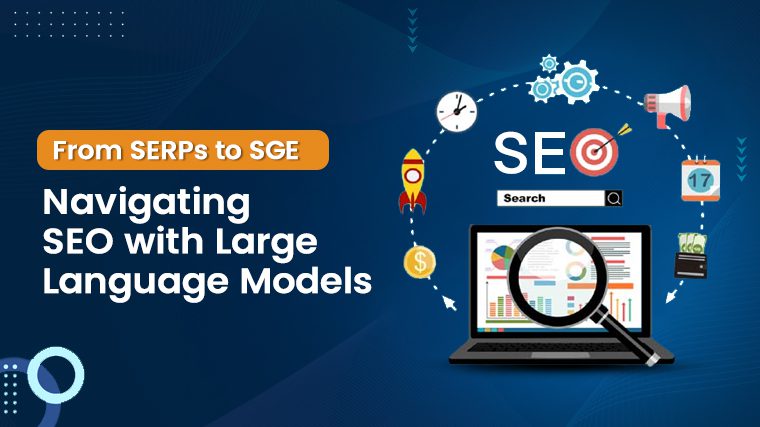
Traditionally, digital landscape changes make an earthshaking revolution thanks to the advent of artificial intelligence and the introduction of Google’s Search Generative Experience (SGE). Businesses, including those hiring digital marketing services in New Jersey, have to adapt themselves to this change to fight hard for visibility on search results. Traditional search engine results pages (SERPs) are now gradually being displaced by chat-oriented, AI-driven interfaces that take more into account user intent and context. This entry looks at the trend of how large language models (LLMs) redefined SEO and presents some strategies for surviving in this new world.
To SGE from SERP
SERPs are traditional in the sense that they rank the web pages based on the keyword, the number of backlinks pointing to them, and the technical optimization of the page. With Google’s SGE built on advanced LLMs such as Gemini, this pattern changes by presenting AI-generated summaries in a conversation, interactive, on the results page itself. Users will get answers specific to the kinds of questions they ask or investigate, rather than having to dig through any of the multiple links shown. According to Neil Patel, SGE aims to bring about a quicker and more intuitive search by pulling information together from various sources and making the search process streamlined (https://neilpatel.com/blog/what-is-sge/).
The Power of AI in SEO
A vital strength of AI is its ability to process large datasets, comprehend a natural language, and predict user behavior. AI will fuel the following significant features in enhancing SEO:
- Monitoring keywords: AI tools such as Semrush and MarketMuse employ semantic clustering to identify high-value keywords, beyond those matched by exact terms but reflecting user intent. Suppose, for example, a digital marketing agency in New Jersey targets long-tail keywords like “New Jersey digital marketing services”, presumably capturing local intent in searches for their marketing activity.
- Content Optimization: AI analyzes the top parcels and gives recommendations for improvement and alignment with the search algorithm. The tool Surfer SEO gives recommendations mainly around structure, readability, and keyword density-based data.
- Technical SEO: Saving countless time and costs, online AI crawls diagnose, audit, and optimize mobile UX.
With these features, companies would be able to write the content most appealing to both users and AI-powered machines, enriching visibility into the competitive New Jersey market.
SEO Transformations Brought by SGE
SGE now shapes how SEO is done, focusing on structured, authoritative, and succinct content. Unlike the general requirement of ranking keywords for high ranking in SERPs, SGE requires one to have authority on the topic and semantic relevance. Here is how businesses can adapt:
- Optimize for User Intent: LLMs have become adept interpretive engines when it comes to framing the context of a query. Create content that answers specific user questions, such as, “What are the best digital marketing services in New Jersey?” Follow this up with how-to guides, FAQs, and easy-to-read headings to align with the conversation.
- Leverage Structured Data: Schema markup (Product, FAQ, or Article schemas) makes it easy for LLMs to understand the information in a logical manner. For example, a New Jersey Digital Marketing Agency might leverage LocalBusiness schema visibility for AI-generated local results.
- Focus on EAT: Google and other algorithms use SGE as one of the methods to present trustworthy sources. Provide good content with citations and author bios, while linking to big names like HubSpot or Moz.
- Incorporate Multimedia: Results from SGE will now include images, videos, and audio. To be leveraged, optimize visuals with alt text description and AI-friendly metadata to ensure high click-through rates.
- Monitor Analytics: Using tools like Google Analytics 4 to analyze items and report on SGE performance. Focus on benefits fostering your conversion ratios, like share of voice, engagement, etc.
Visual Shift in SGE Performance

The chart below shows how organic results within Google’s SGE have shifted from 2023 to 2024, with a notable 55% of SGE results in 2024 excluding top 10 organic links—a clear indicator that SEO strategies must go beyond just ranking in traditional SERPs.
Challenges and Opportunities
There will be areas in which SGE is reshaping AI presents challenges but also opportunities. Consider the possibility that across all industries, but especially finance and health, publishers will lose organic traffic because AI-generated summaries will respond to questions directly. A business that optimizes its web presence will find itself with a competitive edge. A digital marketing agency in New Jersey, for example, can differentiate itself by making hyper-relevant, localized content property that AI models prioritize.
Conclusion
Transitional digital marketing, indeed, is happening from SERPs to SGE, driven primarily by AI and large language models. Digital marketing services, especially in locations like New Jersey, embrace AI-driven SEO to stay competitive among businesses. Optimize for user intent; leverage structured data, putting special emphasis on E-A-T; everyone should be ensuring that visibility is achieved in AI general results. Money is better spent partnering with a thinking digital marketing agency in New Jersey, endowed with AI expertise and e intelligence for strategies aligned to bend with this evolving landscape. SEO has come those who adapt will lead the way.
Navigate SEO with AI
Search is no longer just about keywords, it’s about context and intent. Discover how to align your SEO with SGE and LLM-powered search experiences.




